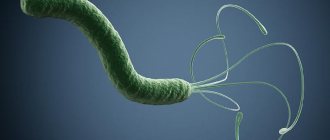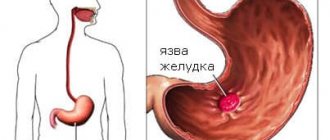- Publications by doctors
Publications by doctors » - Beware of Helicobacter pylori
We discuss the questions most frequently asked by patients regarding this problem.
We asked a gastroenterologist, therapist at the RAMI clinic, associate professor of the Department of Hospital Therapy at the Military Medical Academy, Doctor of Medical Sciences, to answer them. Negrusha Nadezhda Alexandrovna:
The bacterium Helicobacter pylori (HP) is probably one of the most discussed microorganisms both among gastroenterologists and among people not related to medicine.
To understand the importance of HP in the development of stomach cancer, let’s dive a little into history. This microorganism was first discovered in the stomach of dogs in 1874. In fact, half a century later (in 1913), J. Fibiger was able to prove that HP is the cause of the development of stomach cancer, for which he was awarded the Nobel Prize. His work, as well as the work of a number of other scientists, became the cause of great joy among doctors, since it was believed that by defeating HP, humanity would be able to eliminate both peptic ulcers and stomach cancer. But everything turned out to be much more complicated.
Currently, the attitude towards HP is extremely wary (let's call it that). In 1994, experts from the International Agency for Research on Cancer (IARC) named the HP bacterium a “first-order carcinogen,” meaning that in a high percentage of cases it can cause the development of stomach cancer.
The oncogenicity of HP is eloquently demonstrated by studies conducted in Japan in 2010, where the incidence of gastric cancer was the highest worldwide. When examining the country's residents, it was possible to establish that more than 65% of the population over 50 years of age are infected with HP. And eradication therapy (a course of treatment aimed at eliminating the microorganism) made it possible to reduce the incidence of stomach cancer by more than 2 times.
Unfortunately, not all information about HP is disclosed by specialists, which creates the preconditions for misunderstanding of the disease. While seeing gastroenterology patients, I have identified a number of questions that are either most often asked by patients or are not adequately covered in the media. Let's look at some of them.
What is the cause of the development of ulcers and stomach cancer in HP?
The mechanism of formation of a cancerous tumor (carcinogenesis) and ulcerative defect (ulcerogenesis) is quite complex. To describe it in a nutshell, the main cause of the disease is the waste products of the HP bacterium - urease and ammonia. The first substance activates the inflammatory process in the mucous-submucosal layer of the stomach, thereby leading to the development of a defect. And ammonia promotes the development of atrophy (thinning) of the gastric mucosa, accelerated cell division, and, as a result, the development of tumors.
In what cases is eradication therapy necessary?
I often hear from patients that they were prescribed eradication therapy based on the results of a positive rapid test for HP performed during FGDS. But the fact is that at present, when determining treatment and diagnostic tactics, gastroenterologists around the world are guided by a more complex test - Maastricht-4 (and several others). In this regard, the urease rapid test is preferably considered as an initial screening. If the doctor prescribed you eradication therapy only based on the results of FGDS, do not rush to take the drugs - it is better to do additional research to understand that this therapy is really indicated for you.
Homeopathy to treat bacteria
The treatment regimen for gastritis with Helicobacter without the use of antibacterial drugs or in addition to them sometimes involves homeopathic medicines.
Unlike traditional medicine, homeopathy considers helicobacteriosis to be a disease of the entire body as a whole, and not just an infectious process. According to supporters of homeopathic treatment, to successfully destroy bacteria it is necessary to restore the microflora of the gastrointestinal tract and increase the body's immunity.
Official medicine is often suspicious of treatment with homeopathic medicines, but usually does not prohibit their use as additional therapy. In addition, their use is possible if the doctor you trust does not consider the use of antibiotics necessary at the moment.
How is HP treated?
There are 1st, 2nd and 3rd line schemes. The 1st line regimen is prescribed to all patients who have confirmed HP infection, and there are no clarithromycin-resistant strains (that is, a type of HP that is not sensitive to clarithromycin, a drug included in the 1st line regimen). St. Petersburg is not on the list of cities leading in HP resistance to clarithromycin. But if you want to be sure that 1st line therapy will be effective for you, then conduct a sensitivity test to the drug. If resistance to clarithromycin is detected or 1st line therapy is ineffective, treatment is carried out with 2nd or 3rd line regimens.
Helicobacter pylori: to treat or not to treat?
Helicobacter pylori is the most popular bacterium in the world, not only because it is very common, but also because patients have an ambiguous attitude towards it. Many people still wonder: is it so harmful to the body and is it worth getting rid of it?
For answers to these questions, we turned to Elena Miguskina, Ph.D., Honored Doctor of the Russian Federation, gastroenterologist, head of the gastroenterology department of the State Regional Clinical Clinical Hospital.
– Elena Ivanovna, at the end of the last century there was a real “boom” around Helicobacter pylori.
– In fact, they began to talk about the presence of pathogenic flora in the stomach much earlier - back in 1875, a spiral-shaped bacterium was discovered in the gastric mucosa. It’s just that then no one began to think about where it came from and what to do with it.
In 1893, the Italians re-discovered it - but, again, they did not give it a go. Then, in 1899, the Polish professor Jaworski began studying it, and even suggested the possible etiological role of this microorganism in the pathogenesis of stomach diseases.
And towards the end of the 20th century, in 1979, Australian pathologist Robin Warren rediscovered it, and together with his colleague Barry Marshall began research. It was these scientists who were able to prove for the first time that most stomach diseases - ulcers, gastritis, cancer - are associated with this bacterium.
Helicobacter pylori is by far the most common and most studied bacterium in the world.
– Are doctors able to come to a consensus on the identification of this bacterium and treatment tactics?
– There is such a professional community - the “Maastricht Consensus”. Leading gastroenterologists from all over the world gather in the Dutch city of Maastricht to discuss the situation with Helicobacter pylori.
Doctors first met in 1996, and the result of their meeting was Maastricht 1, an agreement that outlined approaches to treatment and choice of therapy. Then there was the second, third, fourth “Maastricht”, and today gastroenterologists of all countries live according to “Maastricht-5”, which prescribes the algorithms for treating the disease today. Fundamentally, approaches to therapy have not changed over the years, but there are still differences in agreements.
– Considering that the study of the bacterium is carried out at such a global level, can we talk about its high prevalence?
– Three billion people on the planet are infected with this “evil” bacterium. In developed countries, up to 30% of the population is infected, in developing countries - up to 100% of the population. Infection occurs at an early age, and there is evidence that by the age of 25, up to 75% of the population may suffer from this disease.
Helicobacter pylori adapts well to the aggressive acidic environment of the stomach, so it lives for a long time. Its long-term presence can cause a number of changes in the mucous membrane - atrophy occurs, which over time can turn into cancer.
– If it is not a myth that Helicobacter pylori can lead to gastritis, ulcers and cancer, then it is necessary to look for and treat it?
– We need to stop the situation associated with the progression of Helicobacter pylori infection. “Maastricht - 4” named clear indications for mandatory treatment of Helicobacter pylori: peptic ulcer, lymphoma, atrophic gastritis, condition after gastric resection for cancer. Also, relatives of patients operated on for cancer were required to undergo therapy. The rest, as follows from the fourth agreement, received treatment at will.
Maastricht 5 makes an important conclusion. Gastritis caused by Helicobacter pylori infection is an infectious disease. And people who are diagnosed with Helicobacter pylori are a reservoir of infection.
Helicobacter pylori causes a chronic infection similar to symptomatic syphilis or tuberculosis. And the outcome can be unpredictable. Maybe everything will be fine, or there may be progression of the disease and a complication in the form of cancer.
At the same time, the absence of clinical manifestations - when a person does not complain about anything, is not considered a sign of the absence of the risk of developing complications. Therefore, “Maastricht-5” says unequivocally: it is necessary to treat everyone who has had a dislocation.
– How is the disease detected if it can be asymptomatic?
– As follows from the fifth agreement, Helicobacter pylori should be detected in two ways. The most comfortable test for patients is the breathing test, which allows you to immediately obtain a reliable result. Or a study is carried out in a biopsy specimen - a histological analysis after an endoscopic examination.
“Anxiety symptoms” should be looked for primarily in people aged 40-50 years. If you have a fever, unmotivated weight loss, vomiting, signs of bleeding, or changes in your blood test, you should also consult a doctor.
Testing for Helicobacter pylori is necessary for people taking aspirin. It is known that taking this drug against the background of Helicobacter pylori infection increases the risk of ulcer bleeding. If bacteria are found, it must be treated before using aspirin.
– How does Maastricht 5 recommend treating patients? Are there any changes in therapy?
– Previously, we treated it like this: proton pump inhibitors plus two antibiotics. And the duration of treatment was 7 days.
Today, inhibitors and two antibiotics remain, but there is also so-called second-line therapy. We are adding quadruple therapy - bismuth preparations. For example, “De-nol”, which is a good cytoprotector for protecting and restoring the mucosa. And the treatment period increases to 14 days.
Eradication therapy today: proton pump inhibitors plus two antibiotics, plus a bismuth drug for a period of 14 days.
– What is the reason for such, albeit minor, changes?
– There is evidence of an increase in bacterial resistance to antibiotics. Unfortunately, we use antibiotics quite often - including for conditions that could be dealt with without them. My throat hurt, my ear “stung” - immediately an antibiotic, and a broad-spectrum one, to be sure. Uncontrolled use of antibiotics has led to bacteria mutating and becoming insensitive to the drugs.
Therefore, a new eradication therapy algorithm has been developed - quadruple therapy with bismuth for 14 days. Today, doctors take into account resistance not only to clarithromycin, but also to metronidazole. Our region, fortunately, is considered prosperous in this regard. A few years ago, there was a study that determined that we have 6% resistance to clarithromycin. And in Russia the average is up to 35% and higher. Therefore, we can still use macrolides – clarithromycin.
– Is there an alternative to taking antibiotics, which kill not only “bad” bacteria, but also “good” ones?
– Today, the only “standard” of treatment is “Maastricht-5”. At the same time, research is ongoing. After all, antibiotics are not suitable for everyone: some have restrictions on taking them, others simply categorically refuse to take them. Their increased resistance cannot be ignored: because of this, more and more powerful drugs are prescribed, and the treatment period is increasing more and more. The idea is that at some point this will reach its limit.
There are already drugs on the market that are not antibacterial. They increase the number of “good” bacteria, due to which the “bad” ones begin to decline. That is, they fight bacteria by displacing pathogenic flora and “populating” the “good” microbe.
– How can you evaluate the effectiveness of treatment?
– After treatment, monitoring is carried out. There is such an important nuance here: after finishing the course, you don’t need to immediately run to research. At least a month must pass from the end of therapy to evaluate its effectiveness. This can be done using a breath test.
How is eradication therapy tolerated?
From my own experience, as well as from the publications of other specialists, I can say – in different ways. There are patients who, when they come for a follow-up examination after eradication, say: “They were more frightening! There were no symptoms." But the most common complaints from patients are:
- bitterness in the mouth (in 95% of cases);
- feeling of heaviness in the right hypochondrium;
- bloating;
- increased rumbling in the stomach;
- the appearance of heaviness or pain in the solar plexus area;
- acne on the face and body;
- various types of allergic reactions;
- candidal vaginitis (thrush) in women.
Some side effects can be avoided by carrying out preliminary prevention. For example, our patients and I first carry out a course of therapy aimed at eliminating the symptoms of exacerbation of gastritis or peptic ulcer, and after their severity has decreased, we begin eradication therapy. In order to prevent the development or progression of disorders of the liver and/or biliary tract, before starting eradication therapy, it is preferable to examine them: take tests, and, if necessary, perform an ultrasound of the abdominal organs. Bloating, increased gas formation, acne on the face, vaginal discharge - all this is a consequence of dysbiosis. Therefore, in parallel with eradication therapy, I always prescribe drugs containing lacto- and bifidobacteria (in women, including vaginally).
What foods should you avoid?
Many people know that when bacteria are detected in the body and gastritis or ulcers are diagnosed, it is necessary to eat properly. But in addition to fried and spicy foods, there are a number of foods that can intensify the symptoms of the disease and provoke the proliferation of Helicobacter.
- These include products containing gluten: rye, wheat, semolina. Gluten is also found in beer. Therefore, if you want to drink a little alcohol on a holiday, it is better to limit yourself to a glass of wine. The fact is that gluten molecules negatively affect the functioning of the immune system and prevent the full absorption of beneficial substances and nutrients. In addition, scientists have found that many people with Helicobacter pylori infection suffer from gluten intolerance.
- Experts have come to the conclusion that people with Helicobacter should limit their consumption of dairy products (due to the high likelihood of lactose intolerance). It is also known that it is undesirable to drink cow's milk if you have high stomach acidity.
- Foreign doctors believe that in case of helicobacteriosis it is necessary to avoid soy-containing food products. These include tofu, soy milk, and sports drinks. Soy negatively affects the functioning of the gastrointestinal tract and suppresses the immune-protective functions of the body.
Effective treatment of Helicobacter pylori is possible only with the use of antibiotics. However, some people after a course of therapy notice that their health has worsened. Therefore, it is recommended to avoid eating foods high in sugar while taking medications. Unfortunately, under the influence of some antibiotics, increased growth of candida fungi begins. To prevent this from happening, it is imperative to use prebiotics and antifungal agents. Some experts believe that it is necessary to reduce the consumption of not only your favorite cakes and carbonated drinks, but also bread and pasta.
Is it necessary to monitor the effectiveness of eradication therapy?
There is only one answer - definitely! As we have already discussed above, there may be clarithromycin-resistant strains, and therefore eradication therapy will be ineffective. To monitor the effectiveness of therapy, studies aimed at identifying the microorganism can be used. However, keep in mind that a urease breath test can be performed almost immediately after eradication, while the antigen to HP in the stool and immunoglobulin G in the blood can persist for a long time (sometimes up to a year). In this regard, it is better to monitor these indicators no earlier than after 2 months. If therapy turns out to be ineffective, don’t be upset. Gastroenterologists have a number of regimens that can be used.
And finally, probably the most frequently asked question.
Natural Treatments
As a complement to antibiotic treatment, as well as to prevent the proliferation of Helicobacter pylori or re-infection with it (especially in the case of weak gastrointestinal immunity), it is recommended to consume certain foods and herbal remedies.
- Modern research has proven that eating certain types of foods can reduce the number of bacteria in the body. These include broccoli sprouts, Japanese plum, coffee (use with caution if you have gastrointestinal diseases), cocoa, and yogurt.
- Drinking cranberry juice daily can inhibit the growth of Helicobacter pylori. The conclusion is based on a study by foreign scientists, which was conducted at the Oncology Department of Peking University. The experiment participants consumed 250 ml daily. cranberry juice. The course of treatment was 90 days, after which most people felt better. Research was also conducted by Israeli scientists who concluded that cranberry juice is effective in the fight against Helicobacter pylori. However, remember that this method can only be used in the absence of any stomach diseases, otherwise you will provoke a serious exacerbation of gastritis or ulcers, since cranberry juice is contraindicated for these diseases.
- Spanish scientists believe that olive oil is an excellent prevention and treatment method for helicobacteriosis. Experts have discovered antioxidant compounds in the product that are effective in combating certain strains of bacteria.
- Although licorice root does not help destroy Helicobacter pylori, it does prevent it from sticking to the walls of the stomach. You can prepare healing infusions based on it, or you can use it in the form of chewable tablets.
- Legends have long been made about fenugreek and its properties. Indeed, an oriental spice called fenugreek helps fight Helicobacter. The seeds also prevent flatulence and inflammation in the gastrointestinal tract.
- Laboratory studies on rodents have shown that Korean red ginseng has an anti-Helicobacter effect. However, this remedy, familiar since the times of ancient civilizations, has contraindications. Therefore, consult a specialist first.
- Baikal skullcap - Scutellaria baicalensis - is considered a natural antibiotic for eradicating the bacterium. However, those people who suffer from diabetes and low blood pressure should be careful with its use. The product should be used with caution in case of poor blood clotting.
First of all, the presence of Helicobacter pylori infection in the body indicates poor immunity. Therefore, the patient’s diet should include foods rich in vitamins A and C. One of the most effective ways to treat Helicobacter at home without the use of antibiotics is to take rosehip infusion. Few people know that its fruits contain 50 times more vitamin C than lemons and other citrus fruits.
Until now, the source of infection by the dangerous bacterium is unclear. However, experts recommend strictly adhering to the rules of personal hygiene and properly processing food products.
Although it is impossible to treat Helicobacter pylori bacteria without antibiotics, there are nevertheless a number of methods that, in combination with traditional drug therapy, will help get rid of it. The main thing is to promptly identify the “culprit” of your poor health and begin treatment.





